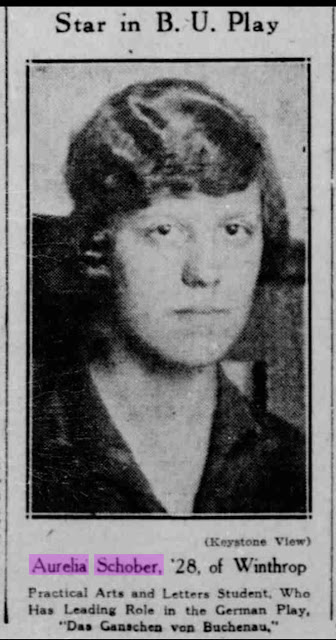Aurelia Plath (nee Schober) as a senior in college wrote a paper for her "English Novel" course about Jane Austen's Pride and Prejudice. Dated December 12, 1927, and graded B-plus/A, it is in the Plath Family Papers at Beinecke Library at Yale, along with Aurelia's copy of the book.
Aurelia later noted in blue ink on its title page:Reviewed in 1983. I'd use another term for the word "fools" today, otherwise a good paper.
This is the only college paper of hers Aurelia preserved in her personal files. Carefully I unfolded and read it, keeping the pages open with weights as one does in rare book and manuscript rooms. On the first page her professor wrote a suggestion in red pencil. I tried to decipher it. Does it say "Figur?"
Rather than ask you to read the photo, I transcribed the page's text, below:
[Begin]"She (Jane Austen) had the fatal gift of observation, which is possibly the rarest gift of all, and where once a foible showed under her eye, she could not help noting it to her reader: it did not matter that she love [sic] and honored the character where she found it." -William Dean Howells
With keen perception and unerring accuracy the realist, Jane Austen, depicted characters that moved upon the little provincial stage where she lived her own part. It was a narrow stage, whereon the chief business of its people "was attention to social duties: and their chief interest was matrimony."*
With a masterly hand Miss Austen selected a motley group of fools. Two individuals of her selection were endowed with superior mentalities, were destined to irresistibly attract each other; therefore to render the play more fascinating, Jane Austen imbued them with pride and prejudice: then, with an ironic smile partially withdrew and watched them act their parts. While she never actually stepped forward upon her stage to comment upon a player's art, yet the reader is conscious that she was standing in the wings, ironically smiling at blunders, silently applauding the rapier-like thrusts of her favorite's clever tongue, and nodding approval as good, cynical . . . .
*Moody and Lovett
I'd have graded this paper a B-minus or a C because it draws solely on ideas presented in the book's introduction by novelist William Dean Howells. Nothing in the paper sounds original. We know from her master's thesis and her college diary that Aurelia could write much better than she did here. In Aurelia's copy of the book, only the introduction has underlinings, made with a fountain pen.
One would say that like most college students Aurelia was probably in a rush and tasked over the weekend with writing papers for her other courses. So she got the novel, read its introduction, and bingo. The sly little minx. Research, as usual, fleshes out the story:
In October Aurelia slipped and fell down the staircase in her dormitory, breaking her ankle, and was taken to Boston's Homeopathic Hospital. We know which hospital because her boyfriend Karl Terzaghi's diary says he sat at her bedside and held her hand. Karl's later diary entry of December 4, 1927, says Aurelia "still needs her crutches." The top student in her class of 1928, candidate for valedictorian, Aurelia had lost at least a week or two of coursework in six courses, and missed lectures and discussion. She was also in pain and hobbling around. Grade-wise, it could have cost her unless she caught up.
The day after her date with Karl, Aurelia bought, signed, and dated her copy of the novel: December 5, 1927, a Monday. She turned in her Austen paper the following Monday.
So like some college students (but never you or I) Aurelia took the easy way out by reading the introduction and padding out her assignment, maybe paging through the novel or reading its final page, as do some students (never you or I) who say they had no time to read the book or write the assignment because they had been away at their grandmother's funeral.But Aurelia fell down the stairs into the dormitory's lobby, landing among students and staff, and when she walked with crutches everyone including her professors knew why.
As her prof, I would have raised the grade on this paper from C or B-minus to "B," because things happen. Aurelia was a little bit special and showed some grit. Her real professor either showed a higher order of charity or was up late with a red pencil reading 40 or 60 other papers.





















